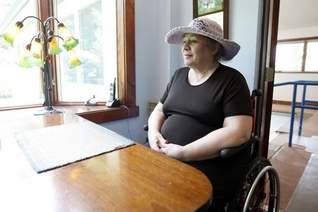By KEITH BROWN • and BILL BOWMAN •

Access has improved since
the Americans With Disabilities
Act
By KEITH
BROWN • and BILL BOWMAN •

Caroyn Schwebel of Middletown, a long-time advocate for
people with disabilities, says much remains to be done to enforce the rights of
the disabled. (STAFF PHOTO: BRADLEY J.
PENNER)
Twenty
years ago, Stanley Soden likely found that some
of the activities most take for granted were at
best troublesome, if not nearly impossible.
Going to the
beach? Nearly out of the question. Grabbing a cup of coffee at a local diner?
Not likely. Attending a baseball
game? Possibly, but with a good deal
of extra planning.
That was
before the Americans With Disabilities Act —
a civil rights act for people with disabilities that
mandates equal opportunity in employment,
accommodations, transportation and several other
areas — which was signed into law 20 years ago
Monday.
Soden, who
uses a wheelchair, is a director for a Long
Branch-based support organization for people
with disabilities. He said the passage of the
"It has
given me access to the beaches, to the restaurants
and places that 20 years ago I would have
never had access to," said Soden, who is a
director of independent living services at MOCEANS.
"The access to me is far greater than it ever has
been."
The act has
not proved to be a panacea for those living
with disabilities, experts said. But the
In
S. Census Bureau. In
The
public entities and public accommodations. It makes
illegal any discrimination based on disability in
hiring or firing of employees, by any level of government or
transportation run by any government,
or in any public accommodation.
One of the
definitions of "discrimination" includes
architectural barriers to allow entry and accessibility
by those with disabilities. All buildings constructed
after 1992 — the effective date of the
"As far
as physical accessibility goes, there have been
great strides," said Sue Pniewski, a transition
and independent living specialist at MOCEAN's
One of those
places is the Americana Diner on Route
35 in
"Before
we had no handicapped access," Louzakos
said. "We put in wider doors — from bathrooms to
even a dining room door that opens out — the
whole nine yards."
There has
been a logical increase in the number of people
with disabilities who now frequent the place,
he said. "I have a lot. It makes me feel good," Louzakos said.
"And they repeat. That's what I like."
But much
still needs to be done to fully integrate people
with disabilities, experts say, both in terms
of building access and other activities of daily
living.
Carolyn
Schwebel, of
"
Schwebel is
chair of the Middletown Human Rights Coalition
and has initiated lawsuits against
"It
really isn't," Schwebel said. "The Americana Diner
has a ramp. Oftentimes when I'm there I'll see at least
five people with disabilities. They get a lot of money
out of it because we go there often."
Unemployment,
which is currently high for the general
population, also is a chronic problem for those
with disabilities.
"The
idea should not be for people with disabilities
to collect Social Security and not work and not
contribute to their communities when they are
perfectly capable and want to," Pniewski said.
Pniewski said
that society's perception, or misconception,
of people with disabilities that represents
the biggest barrier.
"We
still have this attitude toward people with
disabilities — "oh, poor thing.' Even in our
language, like "wheelchair-bound," or that sort of
thing, rather than seeing a wheelchair as a measure
of freedom."
Employers
such as the Lakewood BlueClaws, however,
are trying to change that. The minor league
baseball team partners with the LADACIN Network (formerly Cerebral Palsy of
Monmouth and
"This is
not a job opportunity where we stick them in
the back," DeAngelis said. "They're on the front
lines as greeters, ticket takers and ushers. They also
work in our concession stand."
Ryan Reilly,
coordinator of the Office for Individuals with
Disabilities for
"I'm
very hopeful for the future, with the knowledge
getting out there, the info being spread and the
general public getting to understand more of what
the disability community can do, there's great hopes
the future will keep progressing forward."
Keith
Brown: 732-643-4076 or kbrown@app.com